Publications
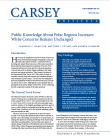
February 7, 2012
The authors of this brief conduct the first comparative analysis of the polar questions that were part of the National Opinion Research Center's 2006 and 2010 General Social Survey. Developed by scientists at the National Science Foundation's Office of Polar Programs, these questions covered topics such as climate change, melting ice and rising sea levels, and species extinction.
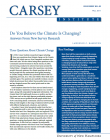
December 6, 2011
This brief explores how political views influence Americans’ understanding and perception of science. The research is based on a national version of the Community and Environment in Rural America survey called NCERA, and on New Hampshire’s statewide Granite State Poll.
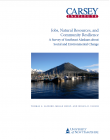
September 27, 2011
As part of the Community and Environment in Rural America (CERA) project, researchers at the Carsey Institute surveyed 1,541 residents of the ten boroughs and unincorporated census areas in Southeast Alaska to better understand social and environmental change in the region and their implications for Alaskan community and families. The authors of this brief report that social problems in the…
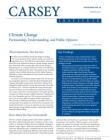
April 19, 2011
In 2010, Carsey Institute researchers began including three new questions about climate change on a series of regional surveys. They asked how much people understand about the issue of global warming or climate change; whether they think that most scientists agree that climate change is happening now as a result of human activities; and what they believe personally about the topic. Survey results…
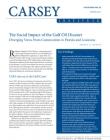
April 12, 2011
Carsey researchers surveyed over two thousand residents of the Gulf Coast following the BP Deepwater Horizon oil rig explosion in 2010 to analyze their perception of the spill. Nearly one-half of all Gulf Coast residents perceived damage to the environment and wildlife as the most serious result of the oil spill. Perceptions regarding the impact of the spill reflect the different relationships to…
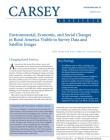
March 1, 2011
This brief focuses on the changing landscapes of different types of rural America where social, economic, and ecological changes are occurring over large areas: the Northern Forest, Central Appalachia, and the Pacific Northwest. These three study sites embody varying historical reliance on land and natural resources and represent very different socioeconomic dynamics. Their common and unique…
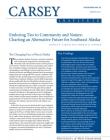
February 15, 2011
Like much of rural America, Southeast Alaska is confronting the social implications of both population declines and the downturn in natural resource-based industries. Although many residents have chosen to leave Alaska in the last decade, the majority have stayed. Strong social cohesion and intimate ties to the natural amenities of the region are what sustain rural Alaskans. It is these…
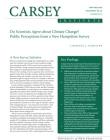
July 13, 2010
This report, a collaboration of the Carsey Institute, the UNH Survey Center, and the UNH Office of Sustainability, is the first of a new initiative that will track public perceptions about climate change as they change over time. Questions related to climate change were asked as part of New Hampshire's Granite State Poll, which surveyed 512 New Hampshire residents in April 2010.
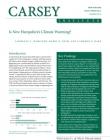
July 1, 2010
This Carsey brief looks at temperature anomalies across New Hampshire and shows that not only is the state warmer than it has been in the past, but it is also warming faster than much of the planet. Sociologist Lawrence Hamilton, research associate professor Cameron Wake, and former NH state climatologist Barry Keim analyzed over 100 years of temperatures across the state to produce this data for…
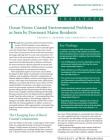
January 25, 2010
This brief contends that loss of fishing jobs and income is the top environment-related concern among residents of Maine's Hancock and Washington counties, as well as forestry decline and water pollution. Also of note, across a wide range of environmental issues, political party affiliation is associated with level of concern about environmental problems.
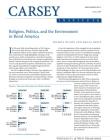
October 14, 2008
Reflecting the heterogeneous nature of rural America, rural Americans are divided primarily along religious lines on their perspectives of environmental conservation and climate change. And as rural voters and environmental issues become key issues in the upcoming presidential election, this religious divide presents a challenge to political candidates.
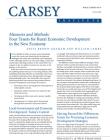
October 1, 2008
Rural communities working to find strategies for success in today's economy need to rethink the tools they are using. Brown-Graham is the executive director of the Institute for Emerging Issues and a policy fellow at the Carsey Institute. William Lambe is the associate director at the Community and Economic Development Program at the School of Government, University of North Carolina at…
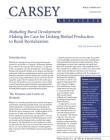
January 1, 2007
Biofuels play a crucial role in America's quest for oil independence. In recent years, the biofuel industry has seen significant technology and efficiency advances, as well as expansions in the materials that can be used to create biofuels. Grains and oilseeds are limited in their ability to meet fuel needs, but a shift to biomass feedstocks offers better production possibilities. For rural…
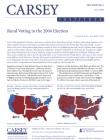
October 1, 2006
Rural votes can often make the difference between what party controls Congress and who is living at 1600 Pennsylvania Avenue. This Carsey fact sheet presents detailed patterns of rural voting by region and shows that these patterns are better explained by looking at demographic factors rather than simply by where people live.
